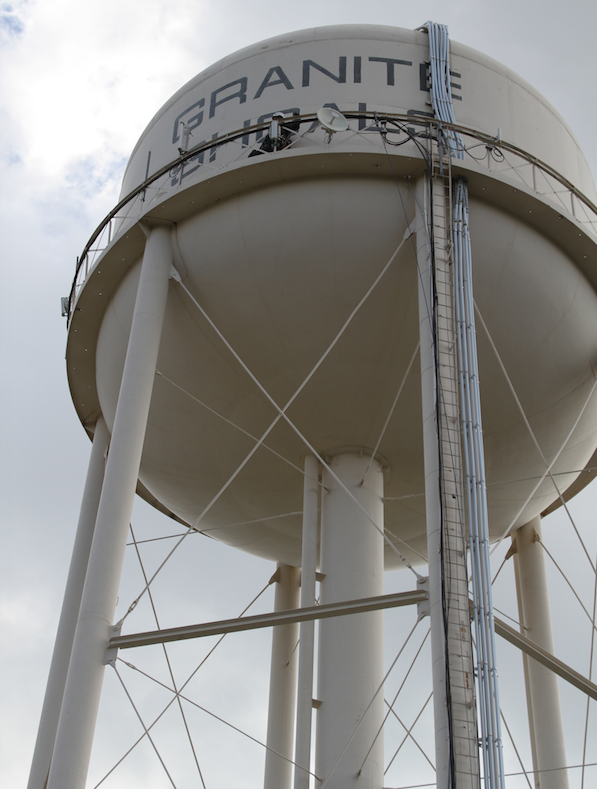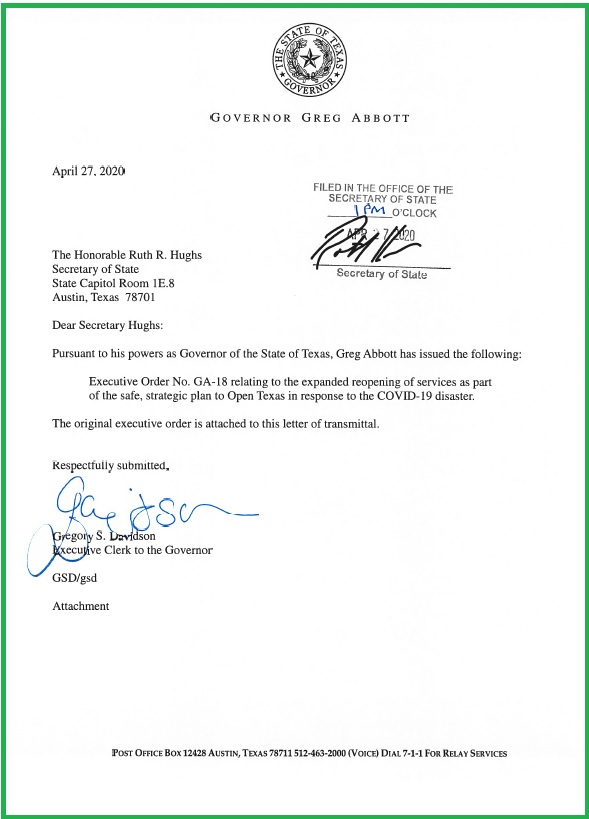Granite Shoals Council considers camping ordinance, water report

Glynis Crawford Smith/The Higihlander
The Granite Shoals main water tower on Bluebriar Drive is the most visible aspect of a system that serves the entire city. At the April 25 meeting of the city council, citizens heard a report of the latest Texas Commission on Environmental Quality review of the city water system.
Glynis Crawford Smith
The Highlander
Despite approving only one action, the Granite Shoals City Council met almost until 11 p.m. Tuesday, April 25, as discussion wore on about topics such as camping regulations and the most recent water report from the Texas Commission on Environmental Quality (TCEQ).
Approved after a public hearing was the request for a replat of five lots into one lot on on the corner of Baker and Briar Way Drives in the Mystic Castle section of the Sherwood Shores Subdivision.
Greg Mayes of Cuplin and Associates represented Weldon Davis, owner of the property where a manufactured home is to be located in the Manufactured Housing-1 (MH-1) zoning district, with no variances requested.
A review of the city camping regulations was prompted by citizens' questions at the Coffee with Council event at Crazy Gals March 25 and two of those citizens attended the meeting. Mary and Allen Weir explained they had discovered that, even by purchase of a permit, visitors in a recreation vehicle would not be able to overnight, according to current city ordinance.
An avid RV'er, Jackie Hatmaker said she and her husband often used their RV as guest accommodations when traveling to visit relatives. Robin Deberard, a member of the Granite Shoals Parks Committee, noted that her family had to stay in a motel, even during the move into their home.
City Manager Ken Nickel explained that up to 2012, the sort of use citizen comments pointed to was allowed within the city. Changes were predicated on lack of sewer hook-ups, labor-intensive enforcement, squatters living on undeveloped property and sex offenders living out of motorhomes.
The council discussion and comments from other citizens led the council to refer a review to the Planning & Zoning Commission.
The council took some time to discuss the latest TCEQ inspection of the city water system.
Assistant City Manager Peggy Smith, also director of utilities, explained a variety administrative responses that had been managed and explained cases of inspectors record-keeping errors.
“Concerning the TCEQ Compliance Inspections on April 4, the inspector noted that our elevated storage capacity is approximately 88 percent,” said Smith. “Planning for expansion of capacity should begin.
The city also operates a small system in Sherwood Shores III and, other than administative action, the report there concerns service pump capacity—approximately 80 percent of provided capacity.
“Planning for expansion should begin there as well along with planning for pressure tank capacity as well,” she said.
Each of the items in the TECQ report had been included in Smith's semi-annual utility reports and budget planning sessions over the last few years, and likely will be view again this summer.
Another small and frequently-discussed topic that was raised regarding the water system was metals readings, in particular lead. In the city's PVC system, lead detected is from customer-side plumbing.
“Values found above the action limit of 0.15 mg/L Lead have been from homes known to have lead solder in house plumbing,” she said. “Lead analysis of the treated water at the point of distribution to both systems has result of <0.010 mg/L which is below detection limit of test.”
Granite Shoals completed the installation of automatic meter reading (AMR) devices in September 2015 as a cost-saving feature for water customers and city employee time management. The vendor has continued antenna installations this year to complete interconnectivity.
Over the years, major improvements to the city water system have depended on a series of successful applications for grants of $250,000-$275,000 in Community Development Block Grant (CDBG) funds. The federal money for rual development has been channeld in two-year cycles from the U.S. Department of Housing and Urban Development through the Texas Department of Agriculture after competitive evaluation by regional councils of government, in this case the 10-county Capital Area Council of Governments (CAPCOG).
The city was not successful in securing that funding to offset the cost of its water plant and in July 2004 the Granite Shoals City Council approved $6.8 million in certificates of obligation to build the existing plant. Some of the grants have helped as the plant has aged and CDBG funds have extended service and doubled the water storage capacity in the city and maintained aging tanks.
New project proposals have become something of a moving target as the population has grown and the infrastructure continues to age. Seventy-five percent capacity of is a trigger point for mandated work on integral parts of the system.






